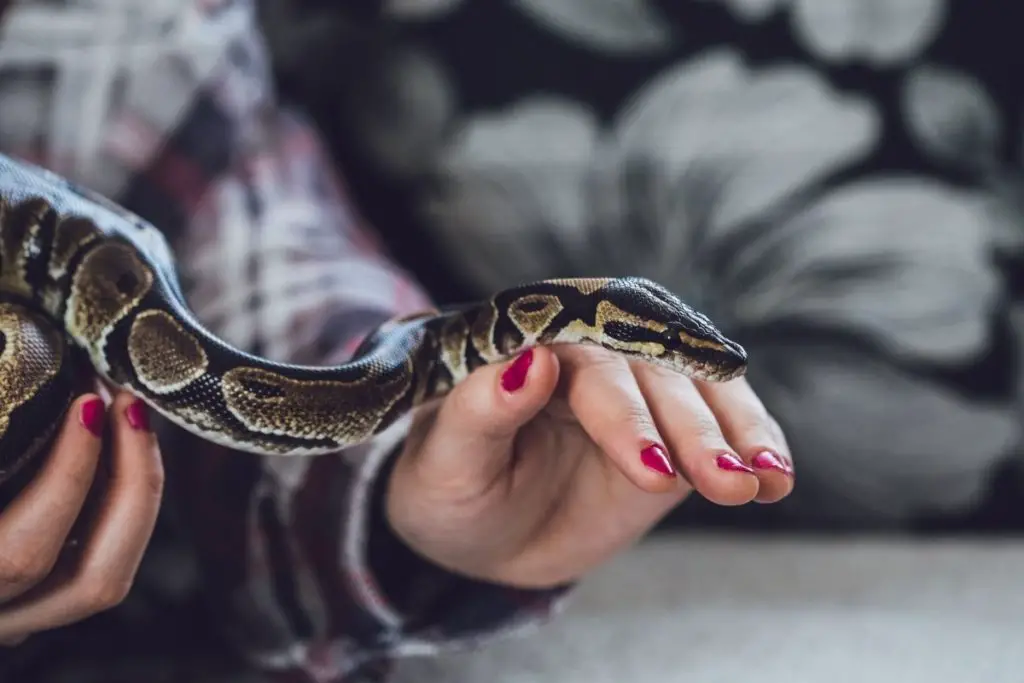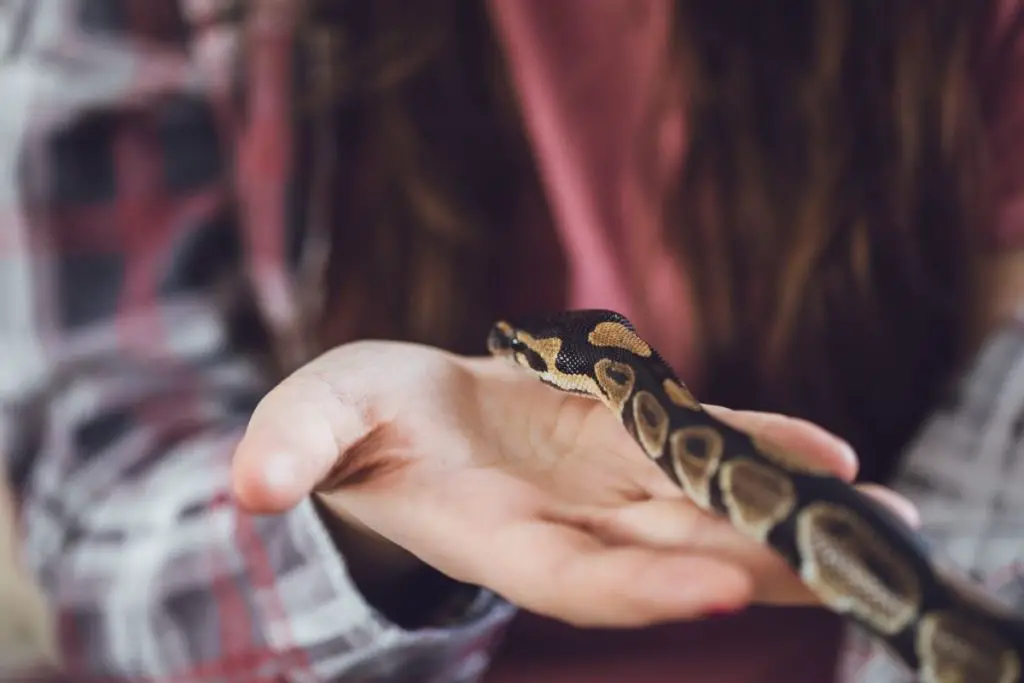Snakes can’t speak, but can they learn their name? If you ask different snake owners and a few scientists, you will get very different answers.
I know this because that’s what I did myself to know the answer. I asked some of my friends who have owned snakes for a while (one of which who owned snakes for decades), and I have gotten very interesting, but very different responses.
Okay, let’s cut to the chase, you want a simple answer, and I will give you one.
So, can snakes learn their names? Snakes cannot learn their names because they don’t have the mental capacity to associate their names with themselves, but some snake owners truly believe their snakes know their names and that’s probably because the snake has recognized the association of the sound patterns of their names with being fed.
So while snake owners may argue strongly that their snakes absolutely know their names and respond to, as far the science has found, snakes just don’t have the mental capacity to understand what their ‘name’ means, but they can still associate their names (when you say it) with good things like food and warmth, which is still a good thing.
In this article, we are going to discuss how do snakes hear, why scientists believe that snakes can not learn their names, and what you can do to build a stronger bond with your snake.
Contents
How do snakes hear?

As you can probably tell, snakes do not have ears. They also do not have eardrums. However, they do have a complete inner ear and a bone in their jaws that can respond to the vibrations of their environment.
For decades, scientists struggled to understand whether or not snakes can actually hear, and it looks like the answer s even weirder than we thought.
The most recent studies show that this quadrate bone in their jaws is reactive to vibrations from both the air and the ground, so snakes do hear sounds, it’s just that the way they receive and interpret these sounds is very different to us.
What Can Snakes Hear?
We can measure the pitch of a sound in HZ and the volume of this sound in Decibels. A healthy person with no hearing problems can hear sounds that have the frequencies 20-20,000 HZ, but we now know that just like dogs and cats can hear a wider range of sound frequencies, snakes are also better than us in detecting low-frequency sounds.
Why can’t snakes learn their names?
Now that we know that snakes can hear, the next question is: can they understand what they’re hearing? And the answer to that is a definitive “no.” Scientists believe this because, as of now, there has been no scientific evidence demonstrating that snakes can make any sense of human speech.
Can snakes understand their names?

To date, there is no evidence that snakes can understand the meaning of their names when spoken to.
There are a couple explanations as to why snakes can’t learn their names. The first has to do with how we learn language. When children are learning to speak, they’re doing so by attaching meaning to sounds. They hear mommy and know what it means. They can attach meaning to sounds because they can associate them with things in their environment that cause those sounds, such as mommy or daddy making the sound “mommy” when they see her/him.
If you’re trying to teach a snake its name by saying it every time you handle it, consider how snakes can’t associate the sound with their name because they can’t see you or what’s around them. They can’t connect your voice to an action, so it would be impossible for them to attach meaning to sounds.
The second reason has more to do with how snakes process information.
Snakes are able to recognize when a certain type of vibration is occurring, but can’t determine where it’s coming from.
When we hear a sound, the auditory cortex in our brain helps us to identify what the sound is and its location. This isn’t something that snakes can do because their cortex is specifically devoted to analyzing vibrations. Without this ability to pinpoint sounds, they can’t understand what they’re hearing, including the meaning of their names.
Why do snake owners believe snakes learn their names?
The fact that some pet owners will believe their pets are capable of things that they actually aren’t capable of is a very good demonstration of what is called “anthropomorphization’.
Anthropomorphization is basically the attribution of human qualities to something that isn’t human. We can learn our names, so our pets must be able to learn their names as well.
But this is not always true, and in the case of snakes, while scientific research is still needed for a definitive answer, it’s most probably the case.
Snakes’ brains are simply not developed enough to be able to recognize and learn their names.
You can learn more about what snakes can and can’t actually understand in this post on do snakes learn, which I highly recommend you do take a minute or two to check out at least.
Can snakes make associations?
Yes, snakes can make associations and even remember some things, to a degree. Snakes can not remember that you have mistreated them, but they will associate you with a threat if you mishandle them repeatedly and will consider you a predator and strike, for example.
I discuss how snakes make associations and what kind of associations can snakes actually make at a greater length in this post on do snakes really take revenge, so do check it out if you have the time.
How to build a stronger bond with your snake?

The same principles that apply to bonding with other types of pets should apply to bonding with your pet snake; Consistency, dedication, and companionship are all important factors in establishing a strong relationship with your snake.
Be patient
Enter each session with an attitude of humility and patience. Set the tone for each encounter by allowing your snake to lead. It’s important to maintain a good rapport with your snake, rather than setting rigid expectations from the start.
Dr. Hoppes, a clinical assistant professor at Texas A&M University’s College of Veterinary Medicine & Biomedical Sciences, explains how a snake indicates negative reaction. “A hiss from a snake that is angry might warn you… This can happen when you focus too much attention on the snake and if you continue to pay attention to them when they don’t want you to, they may strike you.”
“Snakes hiss or coil when they are angry, but most pet snakes aren’t aggressive unless provoked.” (“Reptile Emotions” 2011) Hoppe adds that a brief, good experience, even if it is only for a few minutes, is preferable to an extended period of time that leaves both you and the snake feeling irritated.
You can also learn how snakes show affection here to be able to recognize when your snake is being content and when it isn’t.
Be aware of your body language and movements
When interacting with your snake, be conscious of the way you are positioned in relation to them. Do not reach over or across their body as this can be interpreted as a threatening gesture. Instead, move around to their side or approach them from the front so they can see you coming.
Do not surprise them by sneaking up behind them, which can result in a defensive strike.
Be aware of your body language and movements to avoid any misinterpretations that might lead to an aggressive reaction from the snake.
Snakes are very smart animals so it is important that they feel comfortable with their owners before trying anything too
Be Consistent
Consistency and repetition are crucial in forming a strong bond with your snake. When your snake learns to anticipate you to pick him or her up at the same time, using the same technique, he or she will be able to make the connection between you and your scent and motions.
This is something that many snake owners struggle with. One approach to avoid this problem is to make a schedule for when you feed your snake and add reminders on your calendar.
If you feed them at the same time each day, they’ll be less likely to mistake one for the other. Another way to prevent confusion between feeding and handling sessions is by being consistent in your approach and handling techniques.
Be Dedicated
Just as consistency is important in building a bond with your snake, so too is dedication on the part of the owner. Be prepared to spend time each day interacting with your snake, whether it’s through handling, feeding or just letting them roam around their enclosure.
This not only helps form a connection with your snake, but it also ensures that they have a more enriched environment which will allow them to live happier and healthier.
As for how often you should handle them, the general consensus is at least once a day, so long as each session isn’t too lengthy.
You can learn how to handle your pet snake here.
Helpful Resources
Aggregation and social interaction in garter snakes (Thamnophis sirtalis sirtalis)
If you like this article, please share it!

